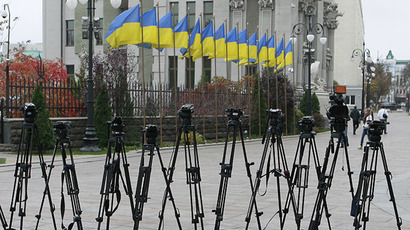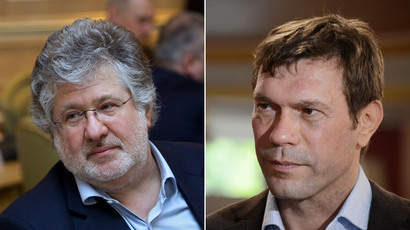Russian journalists being banned entry to Ukraine to cover presidential election
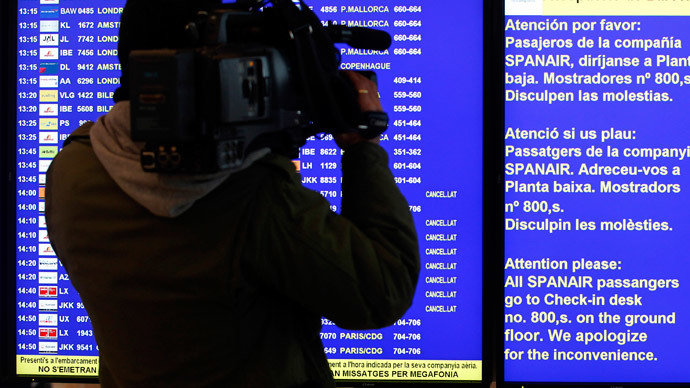
A range of Russian news journalists from different outlets, including RT’s Spanish and Arabic news crews, accredited to cover the upcoming presidential election in Ukraine on May 25, were denied entry to the country without explanation.
RT Spanish cameraman Aleksandr Serichenko and his assistant, Andrey Peleshok, were refused entry at Odessa Airport, southern Ukraine. The journalists have accreditation from Ukraine’s Central Election Commission.
“Without explaining the reason for refusal, the members of [Ukrainian] border service forced the RT crew to buy return tickets at their own expense," said the statement from RT’s press service.
This is not the first time RT journalists have been denied entry to Ukraine. On May 20, journalists from RT Arabic were also refused entry by Ukrainian border police after arriving in Kiev to cover the election. Like the Spanish news crew, journalists from RT Arabic were also accredited by the Ukrainian Central Election Commission.
RT correspondent Anna Knishenko, and her colleagues Elderra Khaled and Konstantin Bolshakov arrived from Moscow in Kiev’s Borispol International Airport.
“At the border control they immediately took our passports. An hour later, we – one by one – were invited to a special room for an interview,” RT’s Anna Knishenko said at the time.
Following individual interviews, border guards gave the journalists papers in Ukrainian and said that they were denied entry since they could not properly explain the purpose of their visit.
On Friday, a correspondent of Echo of Moscow radio station, Ilya Azar, said on his Twitter that he was also denied entrance to Ukraine. He added that he was refused because he “couldn’t confirm the purpose of his trip.”
Отказали во въезде в Украину, ок. Сажают в самолет обратно
— iлля¯\_(ツ)_/¯няшмяш (@A3AP) May 23, 2014
Причина отказа во въезде: не пітвердив мету запланованого перебування в Україні
— iлля¯\_(ツ)_/¯няшмяш (@A3AP) May 23, 2014
Azar has been reporting on the violence in eastern Ukraine for
the past months.
Journalists from two more Russian TV channels were denied entry to Ukraine on Wednesday. Ren-TV crew and two crews of the All-Russia State Television and Radio Broadcasting Company (VGTRK), were banned from entering the country in Kiev’s Borisopol airport. According to the channels’ press services, the journalists had press cards and accreditation to cover the presidential elections issued by Ukraine’s Central Electoral Committee. They were denied entry under the same pretext – they allegedly could not confirm the purpose of the visit.
Media outlaws?
A whole range of Russian media outlets including Channel One, NTV, TVC and Zvezda channels have been denied entry to Ukraine headed by the coup-appointed authorities on May 15-16.
The OSCE’s representative on freedom of the media, Dunja Mijatovic, slammed the harassment of media workers in Ukraine. She confirmed that all of the abovementioned journalists were “accredited by the Ukrainian authorities for covering the presidential elections.”
Human Rights Watch spoke with RT’s Anna Knishenko, along with other Russian journalists refused entry between March and May, and condemned Kiev’s actions.
“While Ukraine has a right to control who enters its country, refusal of entry on arbitrary or discriminatory grounds such as nationality or political opinion is inconsistent with the exercise of that right under international human rights law,” HRW said.
Apart from cases of banning Russian media workers from entering Ukraine, cases of their detention and deportation by special services and law enforcement for covering the events in the east of the country have appeared.
Two Russian journalists working for LifeNews TV channel - reporter Oleg Sidyakin and cameraman Marat Saichenko - were captured by Kiev forces on May 18 near the eastern city of Kramatorsk. Following their detention a video appeared showing Ukrainian troops forcing the handcuffed journalists to get down on their knees under gunpoint.
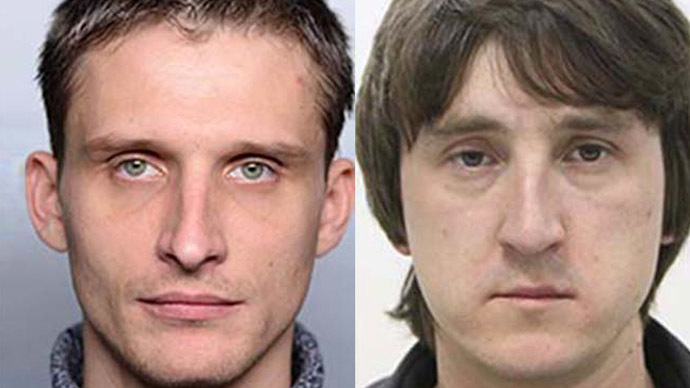
The detained journalists are being investigated on charges of “aiding the terrorist groups,” deputy secretary of Ukraine’s National Security and Defense Council (SNBO) wrote on her Facebook page.
Russia's envoy to the OSCE said that Ukrainian authorities denied a special observation mission to visit the detained Russian journalists.
UN observers cannot find out the location of the detained journalists, said UN Secretary General spokesperson Stephane Dujarric on Friday adding that they are seeking access for lawyers to the detained.
The journalists’ lawyer Tatiana Khokhlova told RIA Novosti on Friday that Ukraine’s Security Council still has not given an official response as to where the detained journalists are being held. She added that lawyers are not permitted to see them.
Russia's Commissioner for Human Rights Ella Pamfilova told RT she
is confused by the fact that international human rights
organizations ignore journalist rights’ violations in Ukraine.
“I am perplexed and confused that the organizations highly
respected by me, including international journalist and ‘without
borders’ organizations ... are suddenly bashfully closing their
eyes or ignoring the rights violations of not only Russian
journalists on Ukraine’s territory.”
There are reports that Ukrainian troops have fired at people with cameras, even at those wearing blue press vests.
On May 9, a Ruptly cameraman was wounded during an armed assault by Kiev’s army on Mariupol police HQ. In spite of his bulletproof vest, the cameraman sustained a serious injury to the abdomen. A medical jet sent to retrieve him was allowed to land in Donetsk only after three days of negotiations.
On May 20, RT contributor and UK national Graham Phillips was detained by Kiev military forces at a checkpoint in the city of Mariupol. He was transferred to army barracks Zaporozhye “at gunpoint” and interrogated by Ukrainian security forces, but released after almost 36 hours of detention.
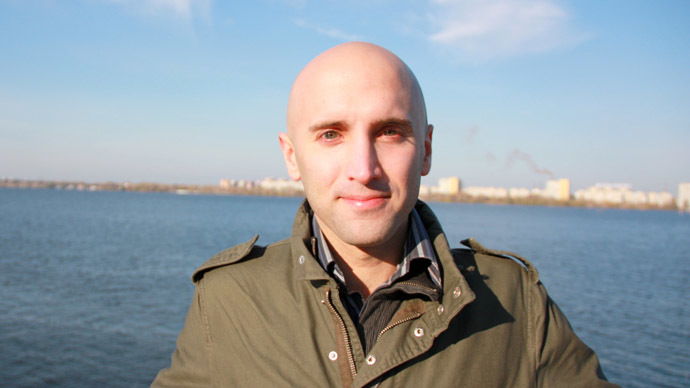
‘Stop equating conflict reporting with terrorism’ – CPJ
The New York based Committee to Protect Journalists (CPJ) condemned on Friday Kiev’s efforts to bar a number of Russia journalists, including RT’s Spanish and Arabic crews from covering Sunday's elections in Ukraine.
“If Ukrainian authorities are looking to build a democratic state, they must stop barring the press from covering public events in the country, especially the presidential vote,” said CPJ's Europe and Central Asia program researcher Muzaffar Suleymanov.
“Openness and transparency are vital for democracy. We urge Ukraine to grant entry to all journalists, no matter their nationality or affiliation, or their newsroom's editorial line.”
The NGO also voiced concerns over the ongoing detention of LifeNews journalists, saying that Kiev should “ensure and enforce rule of law in their case.”
“We also call on the authorities to stop equating conflict reporting with terrorism,” Suleymanov added.
‘Without urgent action consequences will be too grave to even imagine’ – OSCE
In the meantime, the OSCE has released a 14-page report on media freedom in Ukraine, claiming that since the beginning of the Maidan movement that led to a government coup in February, nearly 300 cases of violence against journalists have been reported.
The probe has found that these cases, from the period from 28 November last year to 23 May, include “murder, physical assaults, kidnappings, threats, intimidations, detentions, imprisonments, and damage and confiscation of equipment.”
“The on-going attacks on journalists are nothing short of gross and severe violations of fundamental human rights. Journalists are deliberately targeted for doing their job, trying to tell the outside world of the events that is taking place in Ukraine,” Representative on Freedom of the Media Dunja Mijatović said in a press release.
The OSCE found that journalists have “continually been denied access to events and information, often by force.”
Without urgent action to reverse the deterioration of the media climate Mijatović says “the consequences will be too grave to even imagine.”
It is important to provide journalists with a safe work environment to cover the upcoming elections the OSCE official said. “Journalists must be able to do their reporting in a free and safe manner. With the early presidential election on 25 May in mind I call on the law enforcement agencies to offer all possible support and protection to the members of the media,” she said.













